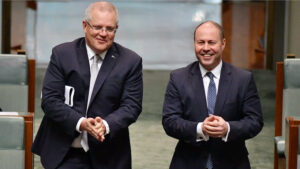Home » Commentary » Opinion » We are all socialists now, but weren’t we always?
· Spectator
 Before the 2007 federal election I posited that ‘Australians are all conservatives now’ (The Australian, 20 April).
Before the 2007 federal election I posited that ‘Australians are all conservatives now’ (The Australian, 20 April).
It argued that thanks to years of reform by Coalition and Labor federal governments, whoever won the election did not matter ‘because during the past two decades conservatives have won all the key policy battles … Australia is on a one-way street of more deregulation, market-based reforms, greater global integration, and less welfarism’.
Even the Rudd-led Labor opposition in the run-up to the 2007 election preached financial austerity and called on the Howard government to be financially prudent in an election year.
We had, it seemed, made a welcome and permanent break from the Australian tradition of the ‘protective state’ characterised by government interventionism, extensive public-owned enterprises, agricultural marketing boards, an over-regulated financial sector and labour markets, and what Geoff Blainey labelled ‘regulationism’.
How wrong can you be!
Such economic reform that laid the foundations of our recent prosperity turned out to be but a brief aberration. Within a year in office, the Rudd government’s fiscal discipline collapsed in its spending over-reaction to the Global Financial Crisis. Industrial relations reform was wound back, and tax reform shelved. Government overreach was everywhere. The Rudd administration lost its nerve as well as its way. Australia reverted to type; squibbing hard policy choices, losing the reform momentum, lapsing into budget recklessness, and appeasing vested interest groups.
The protective state was back in business.
The succeeding Coalition governments of Abbott, Turnbull, and now Morrison have been little better. Elected on a surfeit of cliched slogans parading as policies and promises to cut nothing, the Coalition largely failed to deliver promised budget surpluses. Vital industrial relations reform was ‘dead, buried, and cremated’. Overdue changes to federal-state relations system were shredded. Apart from two tax cuts, the majority of needed tax reform was shelved as too hard. Energy policy was outsourced to international agreements and bodies.
Labor, back in opposition, has quickly forsaken its former economic reform mantle, returned to the bosom of the now vastly shrunken but self-interested union movement, and meted out the same harping intransigent behaviour they got from the Coalition when in office.
The pandemic has accelerated these trends.
Australia’s responses have been increased government interventionism and regulations, and the expansion of our welfare safety net – all supported by huge budget deficits and borrowings.
Responsibilities and key decisions have reverted to the states with each pursuing their own narrow interests.
Meanwhile, the federal government, unlike its predecessors, has been become a member of the pack rather than leader of the board; unwilling to use its fiscal muscle to overcome constitutional restraints to secure consistent policies across the states in the national interest.
The result has been repeated, unpredictable state-initiated border closures and indiscriminate lockdowns necessitating increased welfare payments and business subsidies largely funded by the Commonwealth.
Consequently, the very foundations of our modern free-market economy – the basis of our recent economic success with its free movement of goods, services and workers, deregulation, underpinned by individual choice, business entrepreneurship, and small business innovativeness – have been undermined. Instead, we are headed back to where we once were: a semi-socialist economy enmeshed in a mass of regulations overseen by committees of officials.
And productivity, that key indicator of economic health that for a brief time made Australia exceptional has gone into cardiac arrest. It has been flat-lined for a decade.
Our institutions too, have let us down badly.
Our parliaments have bent easily to executive government demands, freedoms have been too readily cancelled, while our politicised public services and treasuries have succumbed to their political masters’ spending sprees.
Our political parties have betrayed their very reason for being. The Liberals, once the party of small business, have overseen its partial collapse under the weight of government-imposed lockdowns, regulations, border closures – and even fines.
Labor, caught in the grip of appeasing inner-city greens and public sector unions, has turned its back on its own workers; those in retail, services, resources, and transport who cannot ‘work from home’. And who knows what the Nationals are doing for their hard-pressed farming and regional communities…
For a very brief time, Australia broke free from its protective semi-socialist past and its over-reliance on government. During the 1990s onward, the Australian model of reform based on market principles, an open economy, the free movement of people, budget restraint, targeted welfare and all achieved with a modicum of social disruption, was proclaimed around the world.
Look at us now. We have reverted so easily during the current crisis to type. We look to government even more than in the past. The protective state is back. We are all socialists now.
We are all socialists now, but weren’t we always?